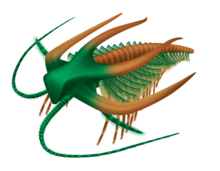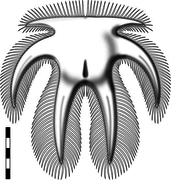Marrellomorpha
| Marrellomorpha | |
|---|---|

| |
| Life restoration of Marrella from the Burgess Shale | |
| Scientific classification | |
| Domain: | Eukaryota |
| Kingdom: | Animalia |
| Phylum: | Arthropoda |
| Class: | †Marrellomorpha Beurlen, 1930 |
| Subgroups | |
| |
Marrellomorpha are an extinct group of arthropods known from the Cambrian to the Early Devonian.[1] They lacked mineralised hard parts, so are only known from areas of exceptional preservation, limiting their fossil distribution. The best known member is Marrella, with thousands of specimens found in the Cambrian aged Burgess Shale of Canada. The group is divided up into two major orders, Marrellida and Acercostraca. Marrellida is recognised by the possession of head shields with two or three pairs of elongate spine-like projections, and three pairs of uniramous appendages on the cephalon, while Acercostraca generally have large ovoid carapaces that cover the entire upper half of the body, and five pairs of uniramous cephalic appendages. Both groups have unbranched antennules and a segmented trunk with biramous appendages.[2] Recent research has suggested the previously enigmatic Cambrian trilobite-like arthropods Skania and Primicaris belong to this group.[3][2] Their phylogenetic position is uncertain, various studies have alternatively placed them in the Arachnomorpha as relatives of Artiopoda (trilobites and kin), as related to Mandibulata, or as stem group euarthropods.[2] Some authors have proposed that they may be closely related to sea spiders (Pycnogonida) within Chelicerata though the cladistical support for such a relationship is relatively weak.[2]
Taxonomy
[edit]After Moysiuk et al., 2022.[2]
- Acercostraca
- Skania Burgess Shale, Canada, Cambrian (Miaolingian) ? Kaili Formation, China, Cambrian (Wuliuan)
- Primicaris Burgess Shale, Canada, Cambrian (Miaolingian), Maotianshan Shales, China, Cambrian Stage 3
- Vachonisiidae
- Xylokorys Coalbrookdale Formation, England, Silurian (Wenlock)
- Vachonisia Hunsrück Slate, Germany, Lower Devonian (Emsian)
- Enosiaspis Fezouata Formation, Morocco, Early Ordovician (Floian)
- Marrellida
- Marrella Balang Formation, China, Cambrian Stage 4 Kaili Formation, China, Cambrian (Wuliuan), Burgess Shale, Canada, Cambrian (Miaolingian)
- Furca Letná Formation, Czech Republic, Upper Ordovician (Sandbian)
- "Furca" mauretanica (nomen nudum) Fezouata Formation, Morocco, Early Ordovician (Floian)
- "Mimetaster" florestaensis Floresta Formation Argentina, Lower Ordovician (Tremadocian)
- Mimetasteridae
- Tomlinsonus Kirkfield Formation, Canada, Late Ordovician (Katian)
- Mimetaster Hunsrück Slate, Germany, Lower Devonian (Emsian)
Fragmentary taxa assigned to Marrellomorpha include Austromarrella from Cambrian Series 3 aged deposits in Australia,[4] and Dyrnwynia from the Ordovician (Darriwilian) aged Llanfallteg Formation of Wales, which in its original description was assigned to Marrelida.[5]
Phylogeny
[edit]After Legg, 2016.[6]
| |||||||||||||||||||||||||||||||||||||||||||||||||
After Moysiuk et al., 2022.[2]
|
Taxa usually not considered marrellomorphs |
Gallery
[edit]-
Ventral reconstruction of Xylokorys
-
Reconstruction of the head shield of Furca bohemica
-
Fossil of "Furca" mauretanica
-
Reconstruction of Mimetaster
-
Restoration of Vachonisia
-
Life restoration of Tomlinsonus
-
Life restoration of Primicaris
-
Diagram of Skania
References
[edit]- ^ Rak, Š. P. N. (2011). "A revision of the Late Ordovician marellomorph arthropod Furca bohemica from Czech Republic". Acta Palaeontologica Polonica. doi:10.4202/app.2011.0038.
- ^ a b c d e f Moysiuk, Joseph; Izquierdo-López, Alejandro; Kampouris, George E.; Caron, Jean-Bernard (July 2022). "A new marrellomorph arthropod from southern Ontario: a rare case of soft-tissue preservation on a Late Ordovician open marine shelf". Journal of Paleontology. 96 (4): 859–874. Bibcode:2022JPal...96..859M. doi:10.1017/jpa.2022.11. ISSN 0022-3360.
- ^ Legg, D.A. (2015-09-30). "The morphology and affinities of Skania fragilis (Arthropoda) from the middle Cambrian Burgess Shale". Bulletin of Geosciences: 509–518. doi:10.3140/bull.geosci.1532. ISSN 1802-8225.
- ^ Haug, Joachim (2012). "A new link between Orsten-type assemblages and the Burgess Shale—a Marrella-like arthropod from the Cambrian of Australia". Acta Palaeontologica Polonica. doi:10.4202/app.2011.0120.
- ^ Legg, David (2016). "A new marrellid arthropod from the Ordovician of Wales". Acta Palaeontologica Polonica. 61. doi:10.4202/app.00246.2016. ISSN 0567-7920.
- ^ Legg, David A. (2016-02-27). "An acercostracan marrellomorph (Euarthropoda) from the Lower Ordovician of Morocco". The Science of Nature. 103 (3): 21. Bibcode:2016SciNa.103...21L. doi:10.1007/s00114-016-1352-5. ISSN 1432-1904. PMID 26922777.



















